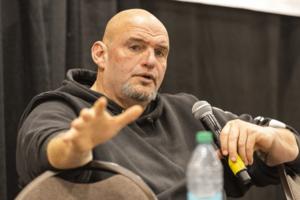Current News
/ArcaMax

Former New York Congressman George Santos reports to prison
Former Rep. George Santos surrendered to a federal prison in New Jersey on Friday to start an approximately seven-year sentence, after pleading guilty last year to wire fraud and aggravated identity theft.
Santos, who previously held a New York congressional seat as a Republican, started his prison term at FCI Fairton in New Jersey, according ...Read more

Criminalization or support? Trump's executive order on homelessness gets mixed reaction
An executive order signed by President Donald Trump purporting to protect Americans from “endemic vagrancy, disorderly behavior, sudden confrontations, and violent attacks” attributed to homelessness has left local officials and homeless advocates outraged over its harsh tone while also grasping for a hopeful message in its fine print.
The ...Read more

Tampa federal prosecutor fired by Pam Bondi files lawsuit over dismissal
TAMPA, Fla. — For almost a month after he was fired from his job as a Tampa federal prosecutor, Michael Gordon refrained from publicly commenting on his situation.
He stayed quiet even as word spread that his ouster was political retaliation for his involvement in prosecutions against those who stormed the U.S. Capitol on Jan. 6, 2021.
U.S. ...Read more

Homeless citations at Sacramento City Hall soar after Mayor McCarty takes office
SACRAMENTO, Calif. — As Sacramento leaders consider banning overnight sleeping at City Hall, police have already ramped up enforcement at the property under Mayor Kevin McCarty’s tenure.
In the past seven months, officers issued at least 187 citations to people sitting or lying at City Hall during the day. Only two such citations were ...Read more

Macron move to recognize Palestine adds to outrage over aid to Gaza
French President Emmanuel Macron’s decision to recognize a Palestinian state builds on international outrage over Israel’s curbs on humanitarian aid entering Gaza, although it’s unlikely to have an immediate impact on the war against Hamas in the territory.
Macron said in a social-media post late Thursday he will announce the change of ...Read more

Trump picks Alina Habba to continue running New Jersey's US Attorney's Office
WASHINGTON — President Donald Trump selected Alina Habba to continue running the U.S. Attorney’s Office in New Jersey on a temporary basis, the latest twist in a succession drama after federal judges had picked her top assistant to take her place.
Trump chose Habba, his former personal attorney, amid an eventful week in which her 120-day ...Read more

Feds charge SoCal medical workers with interfering in ICE raid
LOS ANGELES — Two staff members from an Ontario surgery center have been charged with allegedly interfering with U.S. immigration officers trying to detain landscapers who ran into the center to escape.
Jose de Jesus Ortega, a 38-year-old Highland resident, was arrested Friday morning and is expected to appear in U.S. District Court in ...Read more

'Eddington' actor Micheal Ward charged with rape and sexual assault in UK
British actor Micheal Ward, known for the Netflix series "Top Boy" and and most recently Ari Aster's movie "Eddington," is facing charges of allegedly raping and sexually assaulting a woman in the United Kingdom in 2023.
London's Metropolitan Police announced in a Friday statement that prosecutors had charged BAFTA winner Ward, 28, with two ...Read more

Trump won't rule out pardon for Ghislaine Maxwell amid Epstein investigation
President Donald Trump Friday refused to rule out pardoning Ghislaine Maxwell as the sex-trafficking accomplice of Jeffrey Epstein met for a second day with a top Justice Department official behind closed doors.
As he left the White House for a trip to Scotland, Trump dodged a reporter’s question about whether he was considering cutting short...Read more

Minnesota rejects DOJ's request for state's voter rolls
MINNEAPOLIS — The Minnesota Secretary of State’s office has told the U.S. Department of Justice that it will not share the state’s voter registration list, as the federal government had requested last month.
The DOJ asked Minnesota election officials for voter rolls and other information to show proof it was complying with federal ...Read more

A funeral home gave parents an unmarked box with their son's brain in it, lawsuit says
PHILADELPHIA — About two weeks after their adult son, Timothy Garlington, died in November 2023, Lawrence and Abbey Butler retrieved his possessions from a North Philadelphia funeral home.
Among his belongings was an unmarked white box encasing a smaller, hard-to-open red box.
The couple drove home and left the box in their car. After a few ...Read more

9-year-old dies after incident at Hersheypark's waterpark in Pa.
PHILADELPHIA — A 9-year-old child died on Thursday evening after an incident at Hershey Park’s waterpark, according to the amusement park’s CEO.
“Tonight, a nine‑year‑old guest was tragically lost at The Boardwalk at Hersheypark. From the moment our lifeguard team recognized that a child was in distress, they performed an immediate ...Read more

DHS begins to fly detainees out of Alligator Alcatraz as DeSantis touts convenience of nearby airstrip
TALLAHASSEE, Fla., — Gov. Ron DeSantis said Friday that the federal government has begun sending flights in and out of the airstrip that is attached to the immigration detention center in the Florida Everglades, known as Alligator Alcatraz.
The governor said the federal government has deported about 100 people who were held at the detention ...Read more

We combed through newly released FBI files on Martin Luther King Jr. Here's what we know
ATLANTA — The FBI had long been watching the Rev. Martin Luther King Jr.
They bugged his hotel rooms, tracked his movements and scrutinized his relationships — all in the name of what some in the bureau considered national security.
To them, King was more than the leader of the Civil Rights Movement. He was, in the words of one top ...Read more

Sen. Fetterman says Trump administration will release $1 billion in Pa. infrastructure projects
PHILADELPHIA — President Donald Trump’s administration will soon release more than $1 billion in federal grant money for infrastructure projects across Pennsylvania, according to Democratic Sen. John Fetterman, who has been pushing for the funding to be released.
The department confirmed Friday that some of the funding has been committed, ...Read more

5 questions about Jeffrey Epstein with Miami Herald reporter Julie K. Brown
MIAMI — Julie K. Brown’s 2018 "Perversion of Justice" investigation revealed how the U.S. Justice Department gave the now-deceased sex trafficker the deal of a lifetime and cut his victims out of the process.
That reporting led the Southern District of New York to bring new sex crime charges against Epstein in 2019, but he died in federal ...Read more
After detainee release, US warns Americans: Don't travel to Venezuela
The U.S. State Department has urged Americans not to travel to Venezuela following the release of detained citizens, warning that travelers face the risk of being wrongfully held for extended periods.
The warning was posted Tuesday on the State Department’s social media accounts, four days after President Donald Trump’s administration ...Read more
How a US citizen and former Navy serviceman went missing in Haiti
First, a cop went missing. Then, a cache of rifles issued by the Haitian national police vanished. Then, the gregarious hotel manager charged with safeguarding the weapons was ambushed while driving on a Port-au-Prince street.
His bullet-riddled gray car was later found at a nearby police station.
The mysterious disappearances are now the ...Read more

Florida says it's evaluating storm evacuation options at Alligator Alcatraz
MIAMI — With the peak of hurricane season only days away, Gov. Ron DeSantis defended his administration’s lack of a public hurricane evacuation plan for Alligator Alcatraz, the immigrant detention facility in the heart of the Everglades.
In a press conference at the site on Friday, the governor pushed back at criticism that the state was ...Read more

Miami-Dade mayor demands 'immediate access' and oversight over Alligator Alcatraz
MIAMI — The Mayor of Miami-Dade County is once again demanding access to Alligator Alcatraz, the immigrant detention center in the Everglades that was rapidly built on property seized from the county.
Mayor Daniella Levine Cava’s letter to the state, issued Friday, was a stern call for “immediate access and oversight authority” and ...Read more
Popular Stories
- Trump says not 'necessary' to fire Powell after getting Fed tour
- 'Hell on earth': A Venezuelan deportee describes abuse in El Salvador prison
- A funeral home gave parents an unmarked box with their son's brain in it, lawsuit says
- Trump's homelessness crackdown direction draws pushback and some nods in California's Orange County
- Ghislaine Maxwell 'answered all questions' from Trump DOJ official, attorney says





